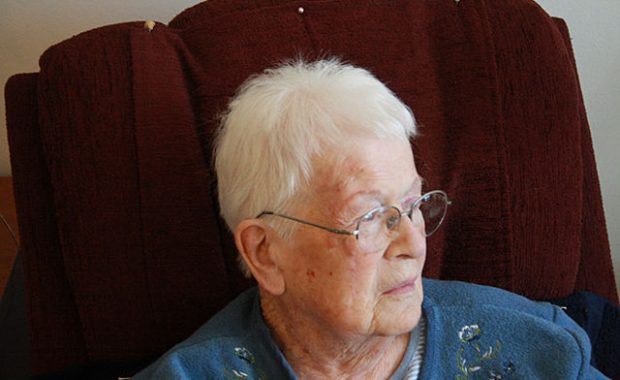BARRY’S BAY – The transportation of patients from Barry’s Bay St. Francis Memorial Hospital (SFMH) to Pembroke Regional Hospital is of concern for one local family.
On February 28, Helene Thurston, 94, was transferred in the midst of a snowstorm, which had begun the previous night.
Helene, and her sister Gwynneth Foster told the Gazette, Helene had recently undergone a suspected TIA, was very frail, was suffering from a number of ailments, among them, a congenital heart condition and a C-Difficile infection.
The acronym TIA, by definition stands for a transient ischemic attack. A TIA is like a stroke and produces similar symptoms. However, it usually lasts only a few minutes and causes no permanent damage. Often referred to as a mini stroke, a TIA can sometimes also be a warning. About one in three people who have a TIA eventually have a stroke, with about half occurring within a year after the TIA. The attack can serve as both a warning and an opportunity – a warning of an impending stroke and an opportunity to take steps to prevent it.
In the early morning, on the harsh winter day, Patricia Thurston, Helene’s daughter, received a phone call from SFMH about her mother’s condition.
Patricia said she drove straight from her home in Killaloe to Pembroke right away. She received the call around 11 a.m., so, she had expected to meet her mother in Pembroke by noon – but her mother didn’t arrive. Instead, Helene arrived at Pembroke Regional Hospital closer to 3 p.m.
By the time the 94-year-old woman arrived, she was in terrible distress and in a lot of pain, Patricia said.
Patricia had travelled up Highway 60 and onto Highway 41 to get to Pembroke. The roads were clear by midmorning, she said.
However, Helene would have a little more trouble getting to Pembroke.
Sometime in the early morning, SFMH dispatched an ambulance to transport Helene to Pembroke.
In Ontario, there is a centralized process for dispatching ambulances to respond to urgent requests. This process is managed by the Ontario Ministry of Health and Long Term Care’s Central Ambulance Communication Centres and ensures that the closest available ambulance responds to a call.
That morning, a few paramedics from the Ottawa area happened to be closest. So, they would transfer Helene.
However, for the most part, Ottawa paramedics do not transfer patients in the Barry’s Bay area, Public Education Information Officer J.P. Trottier explained.
The paramedics used the onboard GPS system, as they are required too, Trottier went on to say, and it indicated the closest road to take.
Unfortunately, the road the paramedics travelled onto was a non-plowed road and the ambulance ended up getting stuck in the snow.
The onboard navigating system’s data is updated according to municipal and regional data, Trottier explained. The paramedics followed the GPS, which indicated the fastest route to take – of course, they had no idea they would end up stuck, he continued.
What’s more, anytime it’s actively snowing, or has been actively snowing, Trottier went on to say, there are risks. The weather did contribute to a delayed transport, he said.
The Ottawa paramedics did dispatch for another ambulance to transport Helene, while they tried to get unstuck, but the paramedic team was back on the road before another ambulance could get to them.
For Helene, however, it seemed like they were stuck forever, she said.
“It was so very cold,” she said. “I was so out of it and uncomfortable, and scared.”
She remembers one paramedic trying to get her to focus on his eyes, but after so long, she said, she had to cut herself off.
“I had to retire into myself to feel like I could make it through the ordeal,” Helene said, rubbing her hand across her forehead, distressed and reflecting back on the situation. “It seemed like such a long period of time before someone lifted the truck up and out of the snow.”
Helene admitted once they got out of the snow, the paramedics did hit the pavement like a bat out of hell.
The Gazette could not accurately determine the amount of time the ambulance was stuck.
According to the Ottawa paramedics, their ambulance left shortly after noon, and arrived at Pembroke’s hospital at 14:33, so, just after 2:30 p.m.
Whereas, Patricia said she received a call by SFMH closer to 11 a.m. that day.
Either way, the first time transport in an ambulance from Barry’s Bay to Pembroke for Helene was an experience she will never forget.
Helene’s sister Foster told the Gazette her sister is still suffering. What’s more, Foster elaborated, they believe the experience contributed to more physical health concerns, as well as emotional distress.
Afterwards, Helene was informed she had a heart attack, Foster said.
Both Helene and Foster agreed they feel lucky considering the circumstances that Helene has survived.
Story continues in the May 1, 2013 issue of The Valley Gazette.
